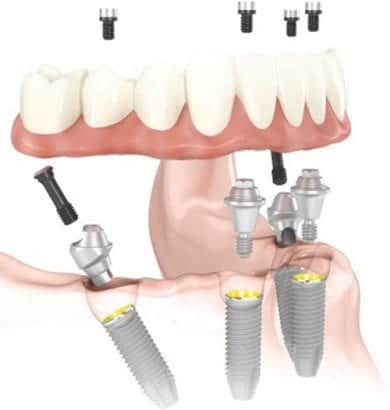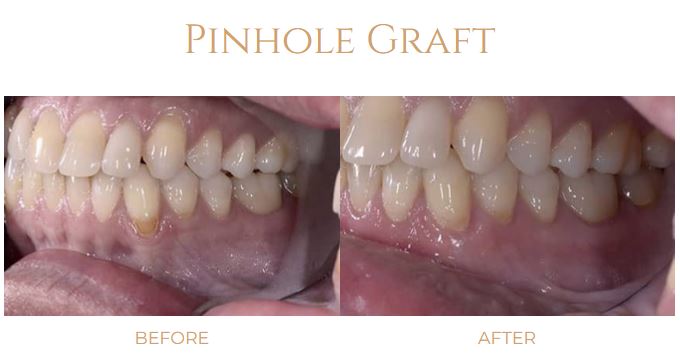I have three remaining teeth, and my dentist recommends All-on-4 dental implants because I have some bone shrinkage. My dentist says I will need a CBCT scan from a periodontist before I get implants. Also, she says that the periodontist might recommend something other than All-on-4 after taking the scan. Do I need a CBCT scan? – Regina from Huntsville, AL
Regina,
Thank you for your question.
What Is a CBCT Scan for All-on-4® Dental Implants?

All-on-4 Dental Implants
A three-dimensional (3-D) cone beam computed tomography (CBCT) scan for All-on-4 dental implants is a technology that takes 3-D images of your oral anatomy. A CBCT scan produces outer and inner views of your orofacial anatomy. The cone-shaped x-ray beam moves around your head to capture the images. One scan gives a periodontist a 3-D view of these areas:
- Teeth
- Bone
- Soft tissue
- Nerve pathways
An April 2020 article in The British Dental Journal states that a CBCT scan allows doctors to provide a more accurate, informed diagnosis and treatment plan.
Why Do You Need a CBCT Scan for All-on-4 Implants?
Reasons that you need a CBCT scan for All-on-4 dental implants include:
- Measure your jawbone volume – Teeth stimulate the jawbone, so when your teeth are missing, your body resorbs the portion of your jawbone that formerly supported your teeth. Your jawbone and implants must fuse to support an arch of denture teeth. The CBCT scan will help your periodontist identify which areas of your bone can support implants.
- Determine whether you need bone grafting – The All-on-4 technique is designed for use when dental implants might otherwise require bone grafting. The procedure minimizes the need for grafting. If you have severe bone loss, your doctor may recommend grafting procedures and other treatment options.
- Precisely measure your mouth and oral structure – Dental implants require precise placement for dentures to fit your mouth well. Your periodontist will use the measurements to identify the optimal places for your implants that will not interfere with your sinuses or other structures.
- Perform computer–guided surgery – Placing dental implants with computer-guided surgery relies on the digital model of your mouth from a CBCT scan.
Schedule an All-on-4 Dental Implants Consultation
Consulting with a periodontist for All-on-4 dental implants will ensure you get high-quality implant fixtures and safe, predictable results. A periodontist is a specialist with three years of specialized training in gum and bone health after dental school. After reviewing your medical history, completing an oral exam, and taking a CBCT scan, a periodontist will create a customized treatment plan.
Dr. David Pumphrey, an Atlanta periodontist, sponsors this post.








